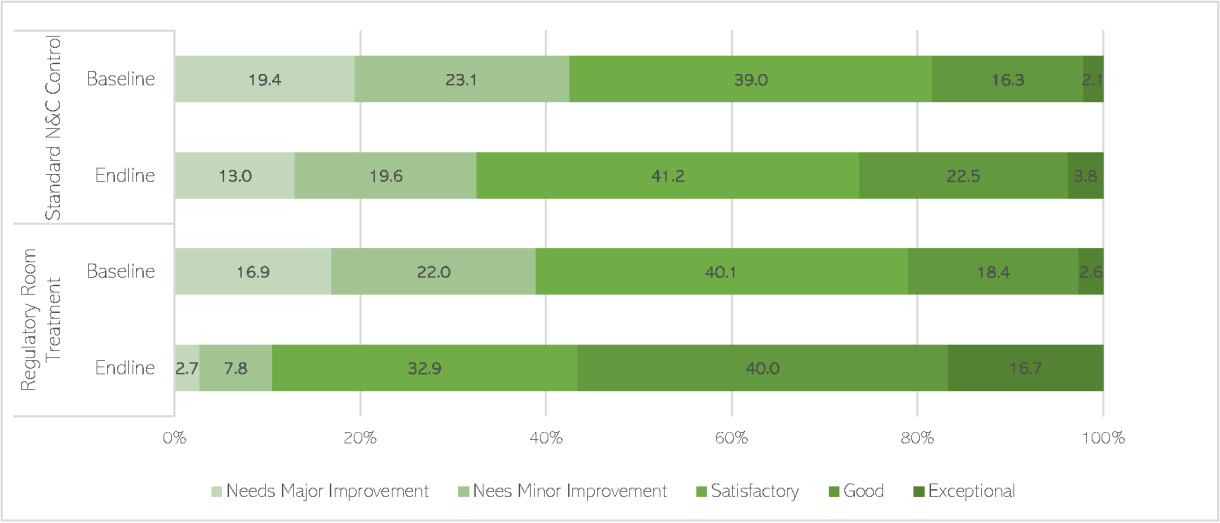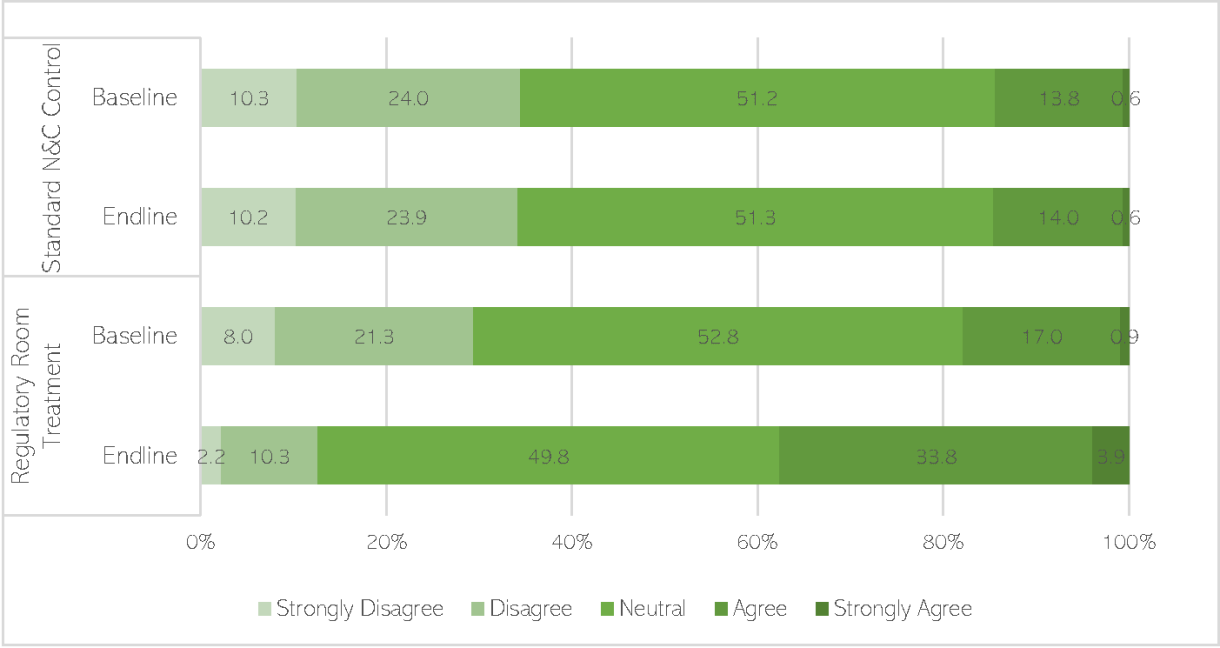
Piloting an experiment in regulation design in Thailand
Can a simple intervention improve SMEs’ opinion of the quality of the notice and comment process and their views of the government’s regulatory legitimacy?
Developing countries commonly face alarmingly low levels of regulatory compliance by firms, endangering the health and safety of citizens and the environment. Previous research indicates that the opportunity to provide feedback during the regulatory drafting process—also known as Notice and Comment (N&C)—enhances firms’ views of government’s regulatory authority, as well as their actual efforts towards compliance. This is evidence of a firm-level version of a mechanism that psychologists refer to as procedural justice, which is particularly relevant for the small- and medium-sized enterprises (SMEs) that are most challenging for resource-strapped developing country governments to regulate. Simultaneously, however, there is also evidence of compliance “backlash”—in other words, reduced compliance—when these same firms find government and its N&C approach to be insufficiently engaged or responsive.
An emerging trend to facilitate this type of consultation is digital N&C, which dramatically reduces the costs of government consultation—for both government and for prospective firm participants. However, the creation of an effective digital N&C system must overcome several potential challenges:
- Firms that participate and post a comment do not always feel heard or potentially feel ignored if draft regulations do not reflect their comments. Transferring the procedural justice mechanism to digital N&C is not a straightforward process. The lack of face-to-face interaction with digital N&C increases the risk that firms will feel neglected, thus increasing the risk of backlash and reducing government legitimacy when comments appear to be ignored.
- SMEs participating in digital N&C often are not experts in regulatory details or legal prose to produce comments that ultimately influence the views of regulators. Regulators will frequently disregard low-quality or unfeasible comments, heightening the danger of backlash.
Our Digital N&C Innovation: “The Regulatory Room”
Our specific vision for strengthening digital N&C involves construction of what we term “The Regulatory Room,” an online space wherein participating firms engage with relevant legal experts, who support them in crafting the most comprehensible, relevant, feasible, and actionable version of their feedback on draft regulations. Our expectation was that such a Regulatory Room would lead to improvement in comment quality that would not only directly support subsequent improvement in the quality of regulations, but also would have the additional benefit of demonstrating to participating firms—of all sorts—that government wants to understand and take seriously their uniquely informed insights. Consequently, firms—especially SMEs—would perceive the N&C process to be meaningfully oriented towards maximizing public welfare and, therefore, would feel greater responsibility to be compliant.
In short, our expectation was that, for participating firms, a properly designed Regulatory Room could enhance the quality of submitted comments, perceptions that comments will be understood by government, beliefs that comments might even lead to revisions, respect for government’s regulatory authority, and, ultimately, efforts to comply with the final requirements of the regulation.
Early Evidence on Our First Regulatory Room Pilot
In collaboration with Thailand’s Digital Governance Agency and its new digital N&C platform (“The Law Portal”), we constructed online video chat room that connected select firms with experienced legal experts tasked with helping them improve the relevance, comprehensibility, and feasibility of their comments. We then designed and implemented an experiment to evaluate if providing firms with access to the Regulatory Room generated positive change in any of the following three outcome areas of interest: 1.) firms’ perception on the consultation process quality; 2.) firms’ views of government’s regulatory legitimacy; 3.) likelihood of comment submission to the online N&C platform; 4.) quality of comments submitted.
For the experiment, we randomly assigned firms to either a control or treatment group. The control group received information about the regulation and the online N&C portal. In addition to this information, the treatment group also received an invitation to participate in the Regulatory Room. We recorded SMEs’ perception of the consultation process quality and views on the government’s regulatory legitimacy both before and after the implementation of the experiment.
Overall, firms that were offered the opportunity to participate in the Regulatory Room saw a larger improvement in their perception of N&C quality between rounds of surveys than firms that were only invited to submit comments. For firms invited to participate in the Regulatory Room, there was a 35.7 percentage point increase in the probability that these firms viewed the consultation process as “Good” or “Exceptional” between the two rounds of the survey. For firms that were not invited to participate, there was only a 6.5 percentage point increase in the probability that these firms viewed the consultation process as “Good” or “Exceptional” between the two rounds. Therefore, firms that were invited to participate in the Regulatory Room saw a 29.2 percentage point larger increase in their views between the two rounds of the survey.
Figure 1 shows the predicted probabilities that a firm in each group will evaluate the quality of the consultation process at each quality level. The question asked was: “How would you rate the quality of government agencies’ consultative process?”
Figure 1: Predicted Probabilities of Firms’ Evaluation of the Consultation Process Quality

In general, firms that were offered the opportunity to participate in the Regulatory Room also saw a larger improvement in their views of the government’s regulatory legitimacy between rounds than firms that were only invited to submit comments. For firms invited to participate in the Regulatory Room, there was a 23.8 percentage point increase in the probability that these firms “agree” or “strongly agree” with the statement that the government has the legitimacy to regulate businesses between rounds of the survey. By contrast, for firms that were not invited to participate, there was a 3.6 percentage point increase in the probability that these firms “agree” or “strongly agree” with the statement on the government’s regulatory legitimacy between the two rounds. Thus, firms that were invited to participate in the Regulatory Room saw a 20.2 percentage point larger increase in their views between rounds of the survey.
Figure 2 displays the predicted probabilities that a firm in each group will evaluate the statement on the government’s regulatory legitimacy at each level of agreement. To minimize the risk of preference falsification by respondents, we asked respondents to rate this statement “Government agencies have sufficient understanding of businesses like this one to effectively carry out their regulatory duties”, instead of directly asking respondents about government’s regulatory legitimacy directly.
Figure 2: Predicted Probabilities of Firms’ Agreement with Statement on Government’s Regulatory Legitimacy

Finally, we found evidence that an invitation to participate in the Regulatory Room improves the quality of comments submitted and the likelihood that firms will submit comments to the online platform, enhancing their relevance, comprehensibility and feasibility.
This pilot provides preliminary evidence that the Regulatory Room – providing SMEs with the opportunity to receive advice from legal experts on how to improve the quality of their comments – can improve perceptions of the N&C process, improve legitimacy of the government’s regulatory authority, and, critically, improve the quality of comments. This establishes digital N&C as a potential scalable intervention that could radically reshape the engagements between businesses and government.
Links
- Working paper: “Digital consultation of firms and perception of government’s regulatory legitimacy: Piloting an experiment in regulation design in Thailand”
- Policy brief: “Can expert feedback improve SMES’ views of government’s regulatory legitimacy? Evidence from Thailand”
Authors
Allen Hicken, Professor of Political Science, University of Michigan
Edmund Malesky, Professor of Political Economy, Duke University; Director, Duke Center for International Development
Songkhun Nillasithanukroh, Research Affiliate, Duke University
Markus Taussig, Associate Professor, Rutgers University
Sponsor
This study was funded by the International Growth Centre.